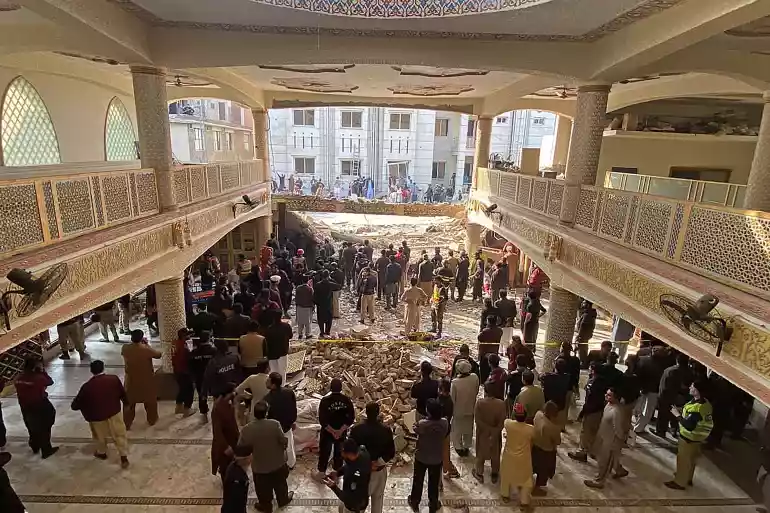
More than 30 people have been killed and about 150 others wounded in an explosion targeting police at a mosque in the northwestern Pakistani city of Peshawar, according to officials.
Muhammed Asim, Lady Reading Hospital spokesperson in Peshawar, told Al Jazeera at least 32 people were killed on Monday and more than 70 injured people were brought in for treatment. A Peshawar police official told Al Jazeera about 150 people were injured in total.
The mosque is inside a highly fortified compound that includes the headquarters of the provincial police force and a counterterrorism department.
Authorities said part of the building collapsed and that many people were feared to be trapped under the rubble.
Peshawar’s police chief, Muhammad Ijaz Khan, said in a televised statement that the capacity of the main hall of the mosque was nearly 300 and it was “nearly full” at the time of the explosion.
“We cannot at the moment confirm there was a suicide attacker but we need to conduct more investigations,” he said. “However, there is a possibility of there being a suicide bomber.”
No one immediately claimed responsibility for the bombing.
The mosque is within Peshawar’s Police Lines, which is part of the city’s red zone where a number of important government installations are, including the Chief Minister House, Governor House, and the Khyber Pakhtunkhwa provincial assembly building.
Al Jazeera’s Kamal Hyder, reporting from Islamabad, said emerging details suggested that the attack was carried out by a suicide bomber.
“The [bomber was reportedly] sitting in the front row of the congregational prayers inside the mosque,” he added.
Prime Minister Shehbaz Sharif condemned the bombing in a statement and ordered authorities to ensure the best possible medical treatment for the victims. He promised “stern action” against those behind the attack.
Former Pakistan Prime Minister Imran Khan took to Twitter to condemn the attack.
“Strongly condemn the terrorist suicide attack in police lines mosque Peshawar during prayers,” he tweeted.
“It is imperative we improve our intelligence gathering and properly equip our police forces to combat the growing threat of terrorism.”
Peshawar, the capital of the Khyber Pakhtunkhwa province bordering Afghanistan, has experienced frequent attacks.
Last March, a suicide bomber attacked a mosque there, killing 64 in Pakistan’s deadliest terror attack since 2018. The Islamic State in Khorasan Province, ISKP (ISIS-K) claimed responsibility for the bombing.
Pakistan has seen a surge in violence during the last year, with numerous attacks on law enforcement officials, particularly in the Khyber Pakhtunkhwa province as well as the southern province of Balochistan.
In November last year, Tehreek-e-Taliban Pakistan (TTP), which has been waging a rebellion against the state of Pakistan for more than a decade, unilaterally ended a ceasefire with the Pakistani state.
In 2022 alone, Pakistan’s monitoring agencies recorded more than 150 attacks launched by the TTP, who are ideologically aligned with the Afghan Taliban, across the country, killing dozens of people.
Authorities fear the return to power of the Taliban in Afghanistan has emboldened the TTP and led to its resurgence.
The group demands the imposition of their hardline interpretation of Islamic law, the release of its members arrested by the government, and a reversal of the merger of Pakistan’s tribal areas with Khyber Pakhtunkhwa province.







